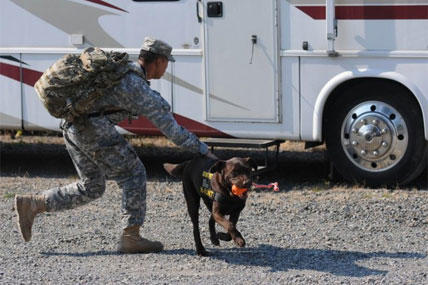JOINT BASE LEWIS-MCCHORD, Wash.-After Staff Sgt. Cuki sniffs her way to the objective, Sgt. Sanchez rewards her with a chew toy. She enjoys her toy so much that it wasn't her intentions to give it up even after the command, "out," was given.
Cuki is a patrol detection explosive dog, whose mood swings often make it difficult for her handler, Sgt. Alfonso Sanchez, 148th Military Police Detachment, Fort Carson, Colo., to complete missions.
"Whenever we travel she doesn't want to eat," said Sanchez, a native of Los Angeles. "Due to her lack of energy she stopped working halfway through the problem."
Sgt. Sanchez, along with four other dog teams from the Army's forces command units, traveled to Joint Base Lewis-McChord, Wash., Sep 17-21 to complete their yearly certification. The categories included detection of explosives in several areas including an RV park, an abandoned school and a warehouse. The certification ensures that the military working dog teams are prepared for both post and deployment missions.
Staff Sgt. Jovan Harris, 51st Military Police Detachment's Kennel Master, served as a liaison for the visiting teams. Previous to being a kennel master he worked in many other dog handling positions. Because of his expertise he knows what the certifiers are looking for in the teams.
"We're looking for them to maintain a certain percentage," Harris said. "We want them to be able to find the training aids at certain depths, heights and quantities."
Sanchez wasn't always a dog handler. He has worked traffic, roads and detainee operations. But it wasn't until his 15-month deployment to Iraq in 2007 when he decided that he wanted to do something specialized in the MP Corps.
"After months of researching several jobs, I put in the paperwork and went to school," Sanchez said. "I've been a dog handler for six years, and I love it."
Cuki has been working with Sanchez for only four months. This certification is important for their team as they prepare for an upcoming mission.
"If I pass this certification then I'll deploy soon," Sanchez said. "Then I'll come back to recertify, and work the mean streets of Fort Carson," he said with a laugh.
Spc. Michael Fillingham, 72nd Military Police Detachment Fort Bliss, Texas, has been a dog lover since he was a kid. Previously a cavalry scout, he enjoys his new job and the challenges that it offers.
"As a scout I would always see the dog handlers working and I would envy them," said the Kansas City, Mo. native. "I wanted to do something that saves lives, and what job is better than playing with dogs all day."
Filingham's partner is Sgt. Denzo, a specialty service dog. They have been working together since Fillingham was in handler's course two years ago.
"He was stubborn at first," Fillingham said. "I have been working with him a lot, we work well together."
He feels that Sgt. Denzo is doing well during the certification and that one specific area Denzo excels at.
"He did very well in obedience," Fillingham said. "At Bliss we share the kennels with border patrol; obedience training there isn't that great. But when I came here I looked at everything and he did great compared to the kennels we have to train on. He listened to all my commands with no hesitation. It's important to build that bond and have obedience with the military working dogs."
Although he feels that they were doing well during certification, much like Sanchez, he still faces some challenges with his dog.
"He's very stubborn and loses his drive," Fillingham said. "Either he wants to relax in the shade or wants a reward. Rewards for him are like gold to us."
Once the certification week is complete the teams will go back to their home stations and continue their current missions or move on to new ones.
"If the dog doesn't certify then its sent back to the home station for retraining or repairing with a new handler," Harris said.
Fillingham is passionate about what he and Sgt. Denzo does for the Army and believes that when the time comes he will be a great asset for saving lives.
"The specialty service dog motto is, 'We find what you fear,'" Fillingham said. "It's what I keep in mind to remember the importance of what I do."

























